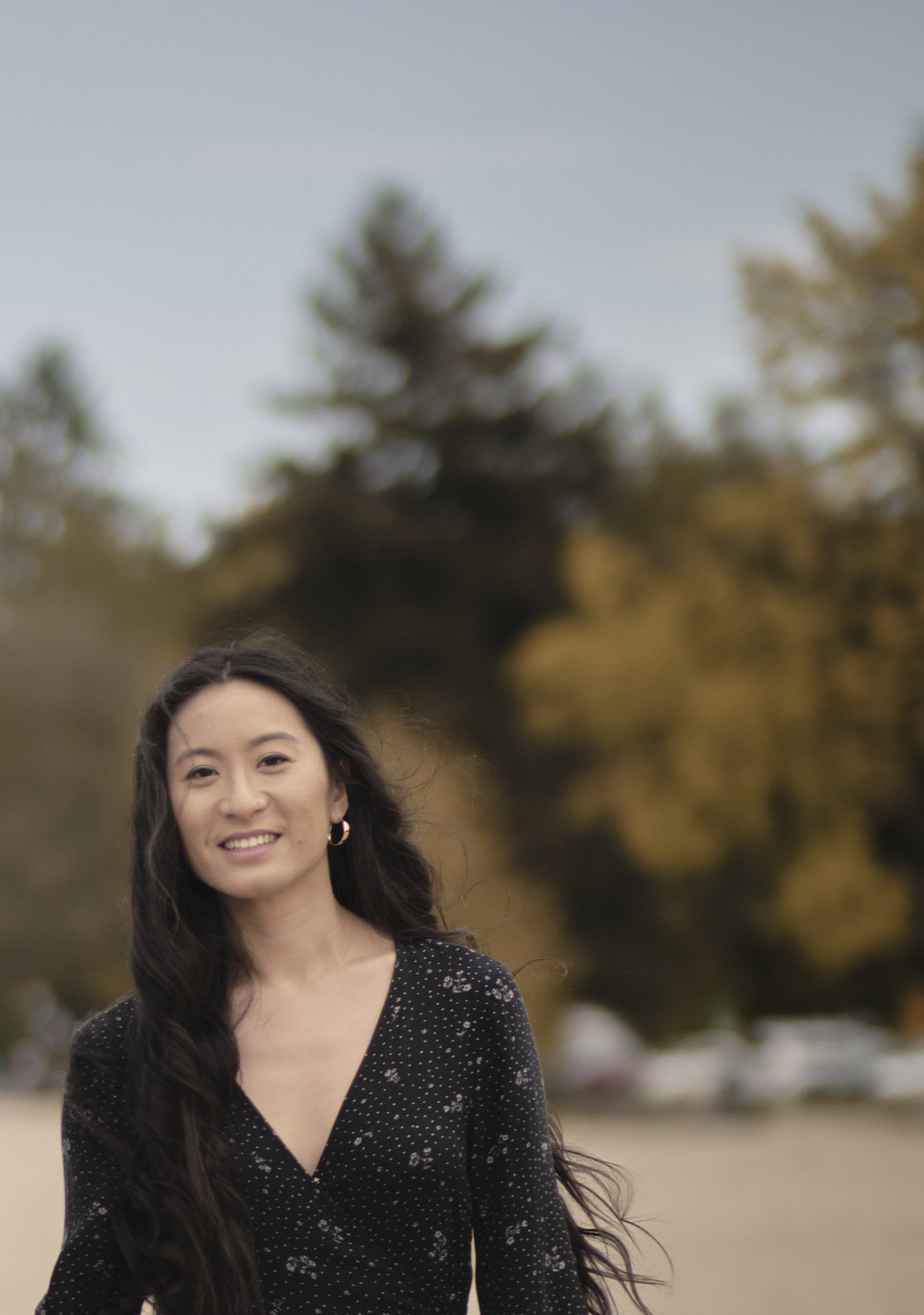Life Lessons Learned from Nature
by Laura Lu: Therapist, Mental Wellness Educator & Advocate
When I was a young girl, my backyard was a forest. It was approximately an acre — in my eyes — of wonder. My younger sister and I would spend countless hours wandering in the forest: collecting twigs and berries, chasing squirrels that darted in and out between the trees, carefully inspecting slugs, worms, and insects we’d find, and playing various make-believe games consisting of grand and treacherous imaginative adventures.
Growing up, I had the opportunity to appreciate nature in this way. Nature was my direct teacher, and I learned about life through interacting with the natural world with my senses: feeling damp, loose soil squishing between my fingers, counting the etched lines on the surfaces of tree bark, feeling the gentle breeze through my hair as I listened to the leaves on the trees rustle and whisper secrets to each other, and interrupting trails of ants scurrying over little hills with sticks.
As I grew into an adult, I started to forget about my wise teacher Nature. Collecting stones and making mud pies were replaced with calendars, paying bills, and commuting to and from the office. However, Nature was always there, reliable and welcoming, whenever I wanted to pay her a visit. The more I matured and learned about life, the more life’s lessons were gently nudging me back to Nature (and what she had taught me when I was younger). Nature knew all along, what it took me 27 years to learn. And she has many more lessons that I haven’t yet uncovered.
Here are a few of the lessons that Nature has taught me about life – through her gentle, powerful, and dynamic essence.
Nature never rushes, yet everything gets done.
A wise and dear friend reminded me of this lesson recently. In this modern age, we are so eager to label our world as “fast-paced”, as well as feel the need to match it. We’ve been conditioned to believe that the formula to live a life worth living is to do more, do it faster, and do it better than anyone else. This phenomenon of the endless, desperate pursuit towards a goal that will never satisfy is one that most of us are aware of (and yes, most of us are also aware of how insidiously it harms us). Yet, the conscious decision to slow down, take a deep breath, and proceed into areas of our lives with less pressure and more ease can be a gruelling struggle with oneself.
Nature reminds us that everything unfolds in its own time. The flower blossoms so fully because it is not rushed; rivers flow into oceans on their own natural timing; the bird’s egg hatches only when it is ready to. Yet everything in Nature that is supposed to unfold, does so. She creates, not because someone has given her a deadline, or because of the pressures of rapid production, but simply for creation and existence itself.
And somehow, through trusting Nature’s timing and process, what is meant to be complete, becomes complete.
Death and loss is necessary for life and rebirth.
Losses and goodbyes are difficult for me, and I know I’m not alone in this. As humans, we dread goodbyes. Grief, loss, and endings fill us with anguish and heartbreak. And many of us will go to great lengths to avoid loss.
As many of us, including myself, don’t want to admit, grief and loss are an important facet of life. Throughout our lifetimes, there will be many losses: death of loved ones, endings of relationships or friendships, losses of jobs, identities, and stages of life, losses of places that we once called our homes, and, perhaps the biggest loss of all, the loss of time – whether our own, or others’.
Nature’s cycles of birth, life, death, and rebirth teach us a lesson of impermanence: that whatever is present and alive today will eventually be lost. And yes, although it sounds bleak, it is also a beautiful thing: death allows us to honour life fully, and grief is a poignant reminder for just how alive we really are.
It can be challenging to accept that death and destruction are necessary for life and rebirth. Similar to many – perhaps including you – I am no stranger to this challenge. Grief and loss can feel so, so painful; earth-shattering, heartbreaking, and feelings of simultaneous, paradoxical emptiness and full-bodied overwhelm can overtake our entire beings. However, Nature shows us that after a cold, barren, dark winter, spring will bring the possibility of new growth and beauty. Just like how lifeless, dried leaves have to fall off the branches of trees in order for new ones to grow, perhaps, in our lives, some of the losses we experience and grieve can also illuminate what is coming up for us next: a rebirth – of identity, relationships, connections to ourselves and others, or reinvented facets of how we experience the world.
May we honour the fullness of our losses, while also allowing glimmers of new life to slowly enter into our lives.
Every season has its own time and important purpose.
One of my favourite quotes is by Cristen Rodgers, spiritual author and essayist. She writes: “Every season of the heart has its own perfect time and an important purpose. Even those that shake you, like the harsh winds of fall shake the trees, for they help you drop unnecessary things. Even those that challenge your footing, like the rains of spring loosen the ground beneath a flower’s roots, because they give you the chance to dig even deeper. And even those that feel like they chill you almost to death, like the winter cold does to the once vibrant flower, for they cleanse and ready you for the beauty of your coming spring.”
As summertime emerges from around the corner after a particularly rainy, gloomy spring (here in Vancouver, Canada), I am reminded that periods of time in our lives can be like the seasons, and that one particular season never lasts forever. Our “seasons of the heart” can be characterised by various energies and emotions: seasons of heartbreak and grief, seasons of growth and expansion, seasons of play, seasons of self-nourishment and rest, seasons of “hustle” and exhaustion, seasons of emptiness, and seasons of meaning and connection.
Additionally, life transitions can be thought of as the changing of seasons. And similar to how the changing of seasons can mean leaving behind aspects of our experience that we’ve gotten attached to, whilst simultaneously looking forward to – with hopeful anticipation – the delights and experiences of the next season, life transitions can be laden with mixed feelings.
Graduation can be exciting yet terrifying, and one might feel the grief of losing their ‘student’ identity and gaining a brand new, unfamiliar one. New parenthood might also feel like a mixture of indescribable joy and painful grief — the delight in nurturing and caring for your child so fiercely, but the loss of your ‘old life’ and independence. Other transitions, such as a new relationship, starting a new job, or coming out with your sexuality may also be attached to both grief and optimism. Just like the seasons of the year, these seasons of life accompany endings and new beginnings.
New shifts, challenges, and emotions arise as we go through these seasons. And since each season has its own perfect time and purpose, may we welcome these challenges and emotions in, and allow ourselves to fully experience the seasons and what they offer you. Taste the snow on your tongue. Curse at the scorching summer sun. Admire the reds and yellows of the falling leaves. Let the spring rains drench you. And, as some would say, take time to smell the roses.
Interconnectedness is the secret to our resilience.
Nature embodies so many beautiful examples of interconnectedness. All of Nature’s patterns consist of interdependent, dynamic networks of life that flow energy between each other – one aspect of Nature cannot function without other aspects, and those other aspects cannot function without the entirety of the network.
One of the most beautiful examples of interconnectedness in Nature is a tree’s root system, which transports and captures nutrients and energy from the earth. One tree’s root system intertwines and interconnects with other trees’ systems, forming a network of roots to draw up greater energy and nourishment to the entire system of trees, buffering its resilience. And thus, the whole system is greater than the sum of its parts.
Similar to trees, human beings have a need for connection and interconnectedness. It is essential to our survival. In fact, our interconnectedness is our very strength; we exist and thrive in connection to others. Especially in the West, our society convinces us of the promise of success by means of individual achievement and independence. However, connection is the key to our evolution and progression in society, because it forms the very basis of who we are. It is programmed into us, even before birth – while we’re in the womb. As humans, the foundation to how we form our relationships with ourselves, others, and the world is learned through attachments formed with our loved ones in our formative years.
It is expected that when we reciprocally support and depend on others, as we were meant to, we can honour our collective humanity, and allow our innate resilience to blossom.
Laura is a therapist - but human first - who has the privilege to walk alongside fellow humans in their pains, joys, fears, and struggles in navigating connections with self and others. It is her greatest honour to meet people no matter where they are in their journey: afraid, heartbroken, confused, wounded, enraged, curious, lonely, anxious, hopeful, excited, uncertain... She strives to show up with compassion, understanding, and safety, so that her clients may be guided to recognize their innate capacity for healing within.
You can find Laura's musings from life, healing, and research on Instagram at @themindhealthspot
Laura is accepting new therapy clients (individual or couples therapy) at Thrive Downtown Clinic (in-person in Vancouver, BC or online) and Women's Mental Health (online).
She also develops free Mental Wellness workshops for young girls aged 8-14 with BeaYOUtiful Foundation, teaching young girls to cultivate a healthy relationship with challenging emotions such as fear, loneliness, and stress.


